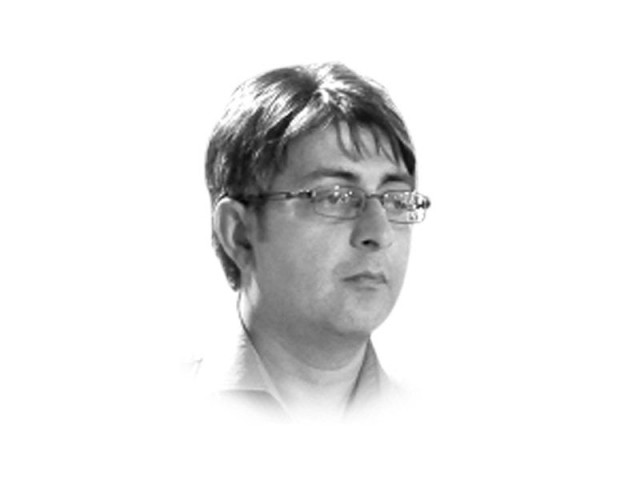Our messianic paradox
To comprehend the true essence of faith, one needs to understand that religion and progress can go hand in hand

The writer is an Islamabad-based TV journalist and tweets @FarrukhKPitafi
Now why is it important? One, because according to this version of the prophecy, today is the day when you should expect this earth-shaking development to materialise. Two, because this is so eerily similar to the discourse we have come across in the Muslim world in the past two decades. If you have not noticed, groups like al Qaeda and ISIS have based their unique selling proposition on the Islamic interpretation of Endism. You can attribute this convergence of thinking between the Jewish, Christian and Muslim communities to their monotheistic origins. However, the story does not end here. While the Rabbi had reportedly claimed that he had met the promised Messiah, even other religions and cultures have dug out their own calendars and prophecies. Remember 2012 with the television countdown clocks? The prophecy was then based on the Mayan calendar’s prediction about a doomsday that did not materialise. So what is going on?
One explanation is about calendars. When a finite set of numbers runs out all you can see - is the end. The creators of the Mayan calendar might have thought an arbitrary date or time to limit their work. According to the Jewish Calendar, this is the year 5780 which seems like a good round number and only a couple of centuries and decades shy of the year 6000 which is really a significant one. So just because of the numbers and calendars, we are expecting an end? Even according to the Hindu tradition this is the last Yuga — the Kali Yuga. Or is it mankind’s collective death wish which keeps predicting an end?
For your mental comfort let me point out that most of these interpretations are secondary in nature. In most cases, the original sources — the holy books of these faiths — do not give a definite number or date. So basically is mankind keen to force its desire on the divine will? It is all but natural to expect to find meaning where there is a dearth of literature. But while no one should challenge any faith’s assertions about the end of times, there is a reason why the information was kept from you. Let the divine will be the judge of what is to come.
There is a reason why I bring this up. Because of hard-lined interpretations of the Islamic faith by a group of militant religious outfits like al Qaeda, humanity had to endure a lot of loss. Pakistan had to endure a lot too. There is a group of people in Pakistan which would want to start a war with India considering it yet another sign of the end. I have heard similar voices from India. It then creates a problem for anyone who doesn’t want a war for the sake of it. Conflicts and crises have a life of their own. They do not need an extra helping hand to start. We can all be good believers, good patriots and not want a conflict which would ruin many lives on both sides and produce nothing but a stalemate. Wars are fought when they become absolutely necessary not based on interpretations of clerics.
There is another explanation of this urgency in the tones of clerics all over the world. The fear of the unknown. So far, humanity’s progress did not create too many obstacles for the interpretation of the clerics. But mankind is on the cusp of a remarkable transformation. From space colonisation and human genome manipulation to automation and the rise of artificial intelligence, the frame of reference is shifting. It does not pose any challenge to any faith or its interpretation of the universe of course. But it does to the human limited understanding of these faiths. For instance, if space colonisation becomes a serious trend do you think that Muslims, Christians and Jews will still struggle to seize control of the Holy Land? How will you relate to the Earth and its holy sites when you travel far and wide into the deep space? How do you treat AI when it becomes self-aware and sentient? How will you decide what is right and what is wrong when every living thing is genetically modified?
These are important questions but certainly not worth an untimely end to this world on your own. If this is certainly the source of discomfort among religious circles around the world, it shows you something significant. Intellectual laziness. When clerics shy away from interpreting religious doctrine in light of the latest developments this essentially skews up the priorities. Mankind can do better in the future. We, mortals, are chemically designed to believe in something. When religious scholars cannot provide mankind with an answer that helps them adapt to changes, then they only abandon humanity and cause a lot of suffering. There is no need for that. If anyone thinks that religions and progress cannot go hand in hand then they do not comprehend the true essence of either faith or progress. Mankind will flourish. The end will come when it has to. In the meantime let us pay some heed to the human suffering we choose to ignore.
Published in The Express Tribune, October 5th, 2019.
Like Opinion & Editorial on Facebook, follow @ETOpEd on Twitter to receive all updates on all our daily pieces.
















COMMENTS
Comments are moderated and generally will be posted if they are on-topic and not abusive.
For more information, please see our Comments FAQ